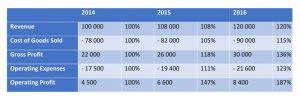
That’s why it’s an accounting faux pas to delete transactions in your accounting software. Business owners should familiarize themselves with reversing entries, which can clear previously recorded transactions without erasing any financial data. For example, if the utilities for each month are paid at the beginning of the next month, you would have used the utilities as of December 31, but you won’t have to pay for them until the next year. The matching principle states that we should recognize the expenses when they are incurred and match them to the revenues they help generate. In this case, the utilities expense should be recorded https://www.bookstime.com/ in December even if it is not paid until January.
Reversing Entry for Accrued Expense

This step is optional and is especially useful to companies that use the cash basis method. If the bookkeeper doesn’t reverse this accrual enter, he must remember the amount of expense that was previously recorded in the prior year’s adjusting entry and only account for the new portion of the expenses incurred. He can’t record the entire expense when it is paid because some of it was already recorded. In the next accounting period the business now has two options, either leave the adjusting entry as it is, or to make a reversing entry.
- For example if Company X wanted to make an adjustment for $600 in unpaid wages, it would debit that amount from the wages expense account and credit it to the wages payable account.
- When the full amount becomes earned by February 29, there’s no need for you to record it anymore.
- Some examples of reversing entries are salary or wages payable and interest payable.
- This expense is accrued by debiting utilities expense and crediting the accrued utilities account.
- On December 1, 2022, one of your tenants promises to pay you at the end of February 2023 the equivalent of 3 months worth of rent covering December 2022 to February 2023.
- Even if you don’t have accounting software, a reversing entry works by simply adjusting an entry from credit to debit or vice versa during the current period depending on the transaction.
- Accounting software automatically numbers all journal entries so that auditors can easily track deletions.
Overview of the Accounting Cycle

Using a reversing entry would simplify the work of the data entry personnel who doesn’t need to consider the impact of any previously-posted adjusting entry. Observe that the above entry still recognized a salaries expense of $7,000 on January 15 which is the same amount of expense recognized when a reversing entry was made. This proves that the same results can be achieved whether or not a reversing entry was made so long as you are aware about the correct amount of salaries expense to be recognized when the actual salaries are paid. Considering that salaries expense normally has a debit balance, allowing a credit balance will make sense once the https://www.facebook.com/BooksTimeInc/ actual salaries are paid on January 15, 2023.
- Adjusting entries for depreciation, bad debts and other allowances also are not reversed.
- Reversing entries refer to those journal entries passed in the current accounting period to offset the entries for outstanding expenses and accrued income recorded in the immediately preceding accounting period.
- In this step, the adjusting entries that were made at the end of the previous accounting period are simply reversed, hence the term “reversing entries”.
- When the temp agency’s invoice dated January 6 arrives, the retailer can simply debit the invoice amount to Temp Service Expense and credit Accounts Payable (the normal routine procedure).
- The reversing entry typically occurs at the beginning of an accounting period.
Trial Balance

He is the sole author of all the materials on AccountingCoach.com. For the past 52 years, Harold Averkamp (CPA, MBA) has worked as an accounting supervisor, manager, consultant, university instructor, and innovator in teaching accounting online. Chartered accountant Michael Brown is the founder reversing entries are optional and CEO of Double Entry Bookkeeping.
Reversing entries are different journal entries that are passed to offset the journal entries which were passed at the end of the immediately preceding accounting year. To illustrate reversing entries, let’s assume that a retailer uses a temporary employment agency service to provide workers from December 15 to December 29. The temp agency will bill the retailer on January 6 and the retailer is required to pay the invoice by January 10. Assuming the retailer’s accounting year ends on December 31, the retailer will make an accrual adjusting entry on December 31 for the estimated amount. If the estimated amount is $18,000 the retailer will debit Temp Service Expense for $18,000 and will credit Accrued Expenses Payable for $18,000.

